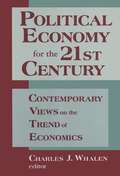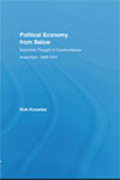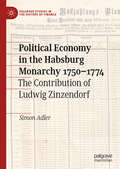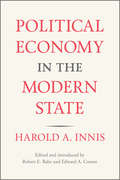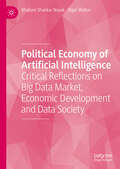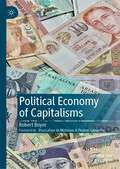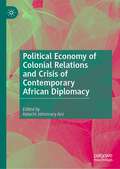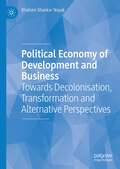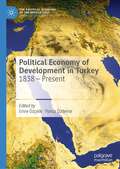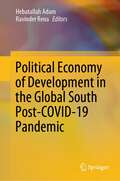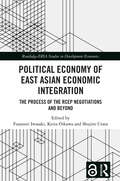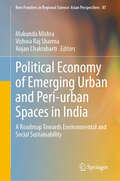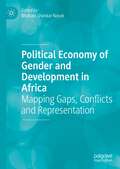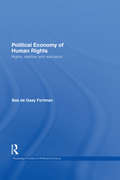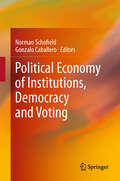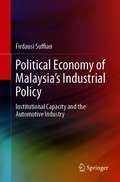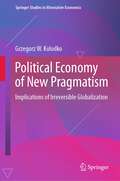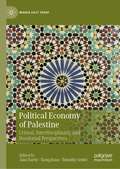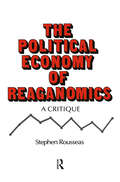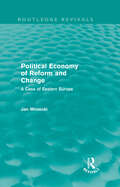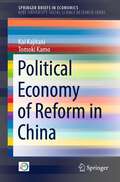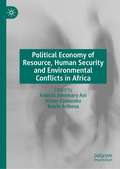- Table View
- List View
Political Economy for the 21st Century: Contemporary Views on the Trend of Economics
by Charles J. Whalen Hyman P. MinskyThis text provides an alternative to conventional economics, drawing on the neoclassical and non-neoclassical insights of Lester Thurow, Robert Heilbroner, Alice Amsden, Barry Bluestone and 11 other prominent economists from America and England. It is intended to provide productive analyses of several contemporary economic problems.
Political Economy from Below: Economic Thought in Communitarian Anarchism, 1840-1914 (New Political Economy)
by Rob KnowlesCommunitarian anarchism is a generic form of socialism that denies the need for a state or any other authority over the individual from above, and which requires absolute belief that the individual cannot exist outside of a community of others. This book suggests that the communitarian anarchists of the nineteenth century developed and articulated a distinct tradition of economic thought. The period of this study begins with the first major writing of the French communitarian anarchist, Pierre-Joseph Proudhon, in 1840 and ends with the temporary burial of anarchist theorizing at the beginning of the First World War in 1914. However, he tradition of communitarian anarchist economic thought did not end in 1914. The economic thought explored in this book provides a fresh perception of the fragmentation evident in many societies today, especially where there is a substantial "informal economy."
Political Economy in Haiti: The Drama of Survival
by Simon M. FassThis important study introduces the conceptual premise that families, like firms, analyze their circumstances, make decisions, and pursue courses of action on the basis of what they perceive to be the most efficient methods for producing and reproducing survival. Combining this premise with an extraordinary assemblage of facts gleaned over the period of a decade from the streets, markets and homes of Port-au-Prince, the author weaves a tapestry of despair and hope which only an unusual degree of intimacy with the details of everyday life in the city could provide. The result is a considerable deepening of understanding about the politics and economics by which family members earn their livelihoods, distribute resources within and between households, produce life and labor from food and water, provide shelter and schooling for themselves, and borrow money to finance these and other activities.These different dimensions of daily existence form a web of interdependency in which change in any one dimension causes change in all the others. As Professor Pass's work demonstrates, research and development assistance practices of public and private organizations, in such areas as employment, health, housing, education and credit are often irrelevant. This is because they are necessarily guided by prevailing concepts and theories with respect to the circumstances of the urban poor, which sometimes do the poor considerable disservice.With the additional insight provided by a decade of participation in the design of policies, programs and projects serving as a tempering influence, the author does not leap to easy criticism of prevailing views and practices. He notes that ideas and interventions change in response to new understanding, sometimes in ways that the producers of such understanding could never have imagined. The problem is that change is painfully slow, and in desperately poor countries like Haiti, waiting for change exacts an almost intolerable price from the poor.This book is a provocative yet highly original contribution which will require serious attention from scholars and practitioners of development. Appearing as it does soon after the great seaward exodus of Haitians and urban unrest culminating in the flight of the Duvalier family, this timely volume will provide illumination for those seeking to understand the circumstances that press people to risk all in the name of survival.
Political Economy in the Habsburg Monarchy 1750–1774: The Contribution of Ludwig Zinzendorf (Palgrave Studies in the History of Finance)
by Simon AdlerPolitical Economy in the Habsburg Monarchy is an important study of the contribution of Austrian Enlightenment economist Ludwig Zinzendorf to the political economy of the Habsburg monarchy in the mid eighteenth century. Simon Adler provides the first comprehensive analysis, and first ever study in English, of the development of Zinzendorf’s thinking on the economy, commerce and, above all, state finances. Political Economy in the Habsburg Monarchy shows the extent to which Zinzendorf’s insights were part of the wider European movement dedicated to understanding political economy as an independent and important activity. It establishes Zinzendorf, a protégé of the State Chancellor Wenzel Anton Kaunitz, as a pivotal figure in the development of Austrian economic and financial policies during the 1750s and 1760s and explains how he challenged cameralism using the most advanced European economic ideas, notably from French writers around Vincent de Gournay. This book is based upon wide-ranging research of primary sources and comprehensive coverage of secondary literature and adds significantly to the ongoing historiographical turn towards political economy in the eighteenth century.
Political Economy in the Modern State
by Harold Innis Robert Babe Edward ComorPolitical Economy in the Modern State is Harold Innis’s transitional and, in some respects, his most transformative book. Completed in 1946, it is a collection of fifteen chapters plus a remarkable Preface selected and crafted to address four main themes: the problem of power and peace in the post-War era; the ascent of specialized and mechanized forms of knowledge involving, most particularly, the media, the state, and the academy; the crisis facing civilization and, more generally, the modern penchant for unreflexive short-term thinking in the face of mounting contradictions; and Innis’s growing focus on what would be called media bias.In this new edition, editors Robert E. Babe and Edward A. Comor provide not only a general introduction to Innis’s largely forgotten book but also dedicated introductions to each of its fifteen chapters and a comprehensive index. Together, Babe and Comor demonstrate how Innis’s volume reflects a shift in Innis’s focus, away from analytical relativism towards, instead, a reflexive search for objective truths.
Political Economy of Artificial Intelligence: Critical Reflections on Big Data Market, Economic Development and Data Society
by Nigel Walton Bhabani Shankar NayakThis book explores how artificial intelligence, the platform economy, and big data will impact economic development and societal change. It outlines how artificial intelligence is used as a capitalist tool that aids the corporate monopoly and creates alienating development. The ways in which artificial intelligence effects governance, economies, and global societies is also discussed, with particular attention given to how it undermines various forms of democracy. This book aims to challenge established theories on artificial intelligence and technological singularity and highlight how they create new forms of capital accumulation. It will be relevant to students and researchers interested in the economic and social impact of artificial intelligence.
Political Economy of Capitalisms
by Robert BoyerThis book is the English language translation of the French publication Économie Politique des Capitalismes. Research in this book presents institutional and historical macroeconomics, through an analysis of wage-labour nexus, innovation systems, monetary and financial systems, integration into the world economy, formation of economic policy configurations, and the history of economic theories. In doing so, the book addresses how and why economic regularities change in long run, and why do macroeconomic adjustments differ across countries within the same historical period. It shows how institutional changes that have occurred since the 1970s and the research on the transformation of the American and French capitalism, have led to the emergence of a research agenda, known as Régulation Theory. Readers would understand the permanent transformations of capitalism and its crises, given the book’s inclusion of long-term historical studies, systematic international comparisons for the contemporary period, and the exploration of the institutional and social foundations of microeconomics which has led to the evolution of various brands of capitalism. This translated work includes an introductory chapter by Prof. Elsa Lafaye de Micheaux and Thomas Lamarche.
Political Economy of Colonial Relations and Crisis of Contemporary African Diplomacy
by Kelechi Johnmary AniThe book presents a historical account of the colonial foundation of African economy and diplomacy. It reveals how the colonial companies and their agents penetrated different parts of Africa and entrenched Western colonialism and imperialism. Ironically, the arrival of these colonial companies became a driver of colonial labour migration as the educated and few privileged African people have to move towards the location of the colonial companies in order to eke-out improved standard of living. It presents the dynamics of import and export trade as promoted by the colonial companies. Consequently, the second part of the book raised the nature of relations amongst some independent African states. First, it reveals the deep-rooted challenge of poverty, migration problem, xenophobia in South Africa and resource conflicts within sovereign border areas of Nigeria and Cameroon as well as the Ethiopian dam crisis with Egypt, as some negative effects of colonialism on some African states. Secondly, it advocated for the advancement of African sports diplomacy, balancing of Chinese African trade diplomacy and improved labour migration within Africa as some paths to sustainable diplomacy in continent.
Political Economy of Development and Business: Towards Decolonisation, Transformation and Alternative Perspectives
by Bhabani Shankar NayakThis book presents an alternative, critical perspective on the political economy of development and business. The everyday issues experienced by those on the margins are examined to highlight the Eurocentric bias at the centre of development theory, public policy, and business practices. Ruling class projects within these areas are critically evaluated in order to present a vision of development that recognises pluralistic traditions and people’s everyday experiences. Eurocentric liberal myopia and its praxis are outlined in development theory, public policy, and business practices. Particular focus is given to tribal planning, needs based development, public private partnerships, modes of capital accumulation, conscious capitalism, and creative business education. This book stands in defense of critical inquiry and pluriversal knowledge against the monolithic knowledge traditions and use of ruling class projects in development, public policy, and business ethics. It aims to explore new forms of economic transformation that are inclusive and worker led. It will be relevant to students and researchers interested in the political economy, development economics, and international business.
Political Economy of Development in Turkey: 1838 – Present (The Political Economy of the Middle East)
by Emre Özçelik Yonca ÖzdemirAdopting a political-economy perspective, this book is an original collection of research chapters that focus on Turkey’s economic-development experience from the nineteenth century to the present. It provides a systematic and chronological examination of Turkey’s major historical dynamics in the economic and socio-political spheres. The chapters are organized according to the consecutive phases of Turkey’s political-economic development. Each chapter not only reflects on the country-specific aspects of those development phases, but also clarifies the dependence of domestic-policy orientations on the dynamics of the world economy. As such, the book provides a historically-conscious, political-economic account of Turkey’s dependent-development experience. The book serves as a quality reference on the political economy of modern Turkey, bringing together fourteen prominent experts as contributing authors who have devoted their intellectual lives to the understanding and explanation of political-economic dynamics in both Turkey and the world. All contributors write on a historical period of the Turkish economy in which they are most specialized. This aspect of the book is a momentous advantage in the field of Turkey's political economy, enabling the highest degree of academic expertise to concentrate in each chapter.
Political Economy of Development in the Global South Post-COVID-19 Pandemic
by Hebatallah Adam Ravinder RenaThis volume brings together contributions from the academic community, policymakers, and practitioners to delve into the profound challenges facing the international system in the aftermath of the COVID-19 pandemic. With a focus on the Global South, it offers a comprehensive analysis of the political economy of development in this region, considering the economic, social, and geopolitical factors at play. The book addresses the multifaceted challenges that developing countries encounter in terms of economic growth, poverty reduction, and social development in a post-pandemic world. It examines the impact of the pandemic on these countries and explores innovative strategies for promoting economic recovery and sustainable development.It is an invaluable resource for anyone interested in understanding the political economy of development in the Global South post covid-19 pandemic. It provides a comprehensive overview of the challenges facing developing countries and offers valuable insights into the potential solutions that can be implemented to foster economic recovery and development. Its interdisciplinary approach and diverse perspectives make it a valuable resource for anyone interested in the dynamics of development in the Global South.
Political Economy of East Asian Economic Integration: The Process of the RCEP Negotiations and Beyond (Routledge-ERIA Studies in Development Economics)
by Shujiro Urata Fusanori Iwasaki Keita OikawaThis book studies the influence of the Regional Comprehensive Economic Partnership (RCEP) on the East Asia region and the rest of the world from an international relations perspective.Analysing the history and negotiation process of RCEP through a collection of written interviews from negotiators involved in the RCEP, this book helps readers understand the origins, proceedings, and characteristics of mega-regional trade integration. Individual case studies analyse the RCEP negotiations from the viewpoint of various states or economic blocs, such as ASEAN, Australia, China, Japan, the European Union (EU), and the United States. Several chapters also illustrate the dynamism of the regional architecture in East Asia concerning other regional movements, including the Trans-Pacific Partnership (TPP), Comprehensive and Progressive TPP (CPTPP), Belt and Road Initiative, and the newly launched Indo-Pacific Economic Framework (IPEF). In sum, the chapters illustrate how RCEP member countries and non-member countries try to utilise/maximise their national interests.This book will interest researchers of international relations, international politics, international economics, and international political economy, as well as policymakers and negotiators responsible for future regional economic integration projects.
Political Economy of Emerging Urban and Peri-urban Spaces in India: A Roadmap Towards Environmental and Social Sustainability (New Frontiers in Regional Science: Asian Perspectives #81)
by Anjan Chakrabarti Vishwa Raj Sharma Mukunda MishraThis book addresses the “urban” and “peri-urban” spaces in India within a single frame. The reasoning is that while the former is studied for its transformation towards more value addition in terms of power and neoliberal economic viabilities, the latter is the land of visible transformation of the built environment. It acquaints readers with how the processes of circulation of migrant labour, the shift in occupations of landowning groups, and the residential cohabitation of diverse social groups contribute to re-scripting social relations, green spaces, and the forging of new subjectivities. The chapters of the book speak of the need to create sustainable cities for uncertain futures, with a quest to reverse global climate change and make an effort to halt urbanization at the cost of the natural ecosystem, all of which have become more urgent in the post-pandemic years. The book addresses different aspects of the evolutionary urban and peri-urban spaces in India amidst the conflict of the environmental and social sustainability agendas with the neo-liberal ascendancy. The integration of urban and peri-urban areas with emerging political and economic equations and the involvement of multiple disciplines to work in tandem for a deep insight into the complex phenomena incorporating diverse actors validate the need for such a volume. This edited volume seeks to record how all these stakeholders—state agencies, political leaders, businessmen, workers, investors, households, builders, real estate intermediaries, business owners, migrants, and many more with their varying capacities to influence outcomes on the ground—interact with one another. It also shows how multiple power relationships are calibrated and recalibrated to produce urban and peri-urban spaces in diverse ways in many parts of India.
Political Economy of Gender and Development in Africa: Mapping Gaps, Conflicts and Representation
by Bhabani Shankar NayakThis book explores the issues and challenges of gender and development in Africa. The current needs of women in Africa are connected with the possible future emancipation of women from institutions and processes that perpetuate poverty to overcome gendered development processes and patriarchal economic policies at work. The role of legal, political, cultural, religious, and economic institutions in development are examined to highlight marginalisation within uneven development processes embedded with capitalism. Broader development issues, such as property rights, food security, accessibility of resources, and environmental change, are also discussed.This book aims to reimagine African development from an issue-based perspective that moves beyond gender stereotypes and narrow silo of patriarchal development. The volume is relevant to students and researchers interested in the political economy, development and feminist economics.
Political Economy of Human Rights: Rights, Realities and Realization (Routledge Frontiers Of Political Economy Ser.)
by Bas de Gaay FortmanThe plethora of literature produced over the past decade in response to the perceived failure of the human rights project to deliver results for billions of people living in ‘adverse’ environments has usually focused on international legal standards and mechanisms, with little regard for the root structural realities that constrain their implementation. Hence, a text that primarily focuses on the major challenge of realisation of human rights in the context of diverse realities is urgently needed. This book, then, provides an analytical as well as inspirational text on human rights from a contextual perspective; it offers a reconceptualisation of human rights as not merely legal resources, but political tools as well. After an introduction that familiarizes the reader with some of the key concepts used throughout, the book is divided into six chapters. The first two combine a critique of the overly legal use of human rights with a reconceptualisation of their potential as powerful tools outside of the legal context. The next two chapters examine the nature of the structural challenges that face realisation, both on the global and on the local level. The last two chapters analyse two major areas of the human rights deficit: the structural non-implementation of the rights of the poor and the failing protection of non-dominant collectivities. Finally, a concluding chapter elaborates on the main findings and insights gained. The book combines rigorous juridical study with a focus on political-economic analysis of rights in context. Hence, it aims at an interdisciplinary treatment of human rights as opposed to current texts that have a tendency to be monodisciplinary. The book should be of interest to students of human rights, political economy, law and conflict studies, as well as those who work or research in these areas.
Political Economy of Institutions and Decisions: Above Politics
by Gary J. Miller Andrew B. WhitfordEconomic development requires secure contract enforcement and stable property rights. Normal majority-rule politics, such as bargaining over distributive and monetary policies, generate instability and frequently undermine economic development. Above Politics argues that bureaucracies can contribute to stability and economic development, but only if they are insulated from unstable politics. A separation-of-powers stalemate creates the conditions for bureaucratic autonomy. But what keeps delegated bureaucrats from being more abusive as they become more autonomous? One answer is the negotiation of long-term, cooperative relationships - that (when successful) typically bind subordinates to provide more effort in exchange for autonomy. Even more compelling is professionalism, which embeds its professional practitioners in professional norms and culture, and incidentally mitigates corruption. Financial examples are provided throughout the book, which ends with an analysis of the role played by professionalized bureaucracies during the Great Recession.
Political Economy of Institutions and Decisions: Marketing Sovereign Promises
by Cox Gary W.How did England, once a minor regional power, become a global hegemon between 1689 and 1815? Why, over the same period, did she become the world's first industrial nation? Gary W. Cox addresses these questions in Marketing Sovereign Promises. The book examines two central issues: the origins of the great taxing power of the modern state and how that power is made compatible with economic growth. Part I considers England's rise after the revolution of 1689, highlighting the establishment of annual budgets with shutdown reversions. This core reform effected a great increase in per capita tax extraction. Part II investigates the regional and global spread of British budgeting ideas. Cox argues that states grew only if they addressed a central credibility problem afflicting the Ancien R#65533;gime - that rulers were legally entitled to spend public revenue however they deemed fit.
Political Economy of Institutions, Democracy and Voting
by Norman Schofield Gonzalo CaballeroThis book presents the latest research in the field of Political Economy, dealing with the integration of economics and politics and the way institutions affect social decisions. The authors are eminent scholars from the U.S., Canada, Britain, Spain, Italy, Mexico and the Philippines. Many of them have been influenced by Nobel laureate Douglass North, who pioneered the new institutional social sciences, or by William H. Riker who contributed to the field of positive political theory. The book focuses on topics such as: case studies in institutional analysis; research on war and the formation of states; the analysis of corruption; new techniques for analyzing elections, involving game theory and empirical methods; comparing elections under plurality and proportional rule, and in developed and new democracies.
Political Economy of Malaysia’s Industrial Policy: Institutional Capacity and the Automotive Industry (Springerbriefs In Political Science Ser.)
by Firdausi SuffianThis book examines the national automotive policy in Malaysia to help readers gain an understanding of the country’s industrial policy-making processes. Addressing a gap in analysis of the political economy of the national automotive policy, the research presented combines the new institutional theory and the developmental state approach to provide new insights into elite policymakers’ measures to shield domestic automotive enterprises from pro-market reforms. The formation of the national car project marks a turning point for Malaysia's industrial development as a country, which it envisions will lead to it becoming a major player in the global automotive market. However, the domestic institutional factors embedded in ethno-economic interests and patronage constrain national car-makers, limiting their potential to grow, and instead causing a slowdown in the industry.Allowing readers to understand the background to Malaysia’s heavy industrialisation programme and the birth of its national car projects, this book critically discusses the significance of institutional context in policy outcomes, and highlights how institutions and policies have impact growth or decline. It is a valuable resource relevant to analysts, researchers and students who are interested in the political economy of the national industrial policy and automotive industry in Malaysia and beyond.
Political Economy of New Pragmatism: Implications of Irreversible Globalization (Springer Studies in Alternative Economics)
by Grzegorz W. KolodkoThis book provides answers to fundamental questions of sustainable development and international cooperation in light of irreversible globalization. Based on comprehensive research and a wealth of experience from his own political activities, the author offers an insightful analysis of the globalized economy and its political, cultural and ecological context. Presenting an objective assessment, the author diagnoses the state of affairs and formulates recipes to overcome present day challenges, such as income inequalities, climate change, demographic imbalance and the new Cold War, which overlap with the “black trinity”: populism, nationalism and authoritarianism. "Grzegorz Kolodko is one of the most acute observers of the international economy, based on long experience both as a practitioner and as an academic. His writings are always an important starting point for debate and discussion about the political economy of globalization." Francis Fukuyama, Stanford University, author of “The End of History” "Grzegorz Kolodko unites deep policy experience, a vast breadth of observation and a solid grip on real-world economics in his case for a new pragmatism. For all involved in the causes of peace, justice, shared prosperity and public purpose, he is a leader and an ally." James K. Galbraith, The University of Texas at Austin "Dr. Kolodko delivers comprehensive and inspiring economic analysis, drawing on his rich historical political leadership. His probing and insightful assessment of globalization in today's and tomorrow's world is a must read." Rev. Jesse L. Jackson, President of Rainbow Coalition and International Civil Rights Activist
Political Economy of Palestine: Critical, Interdisciplinary, and Decolonial Perspectives (Middle East Today)
by Alaa Tartir Timothy Seidel Tariq DanaThis book explores the political economy of Palestine through critical, interdisciplinary, and decolonial perspectives, underscoring that an approach to economics that does not consider the political—a de-politicized economics—is inadequate to understanding the situation in occupied Palestine. A critical interdisciplinary approach to political economy challenges prevailing neoliberal logics and structures that reproduce racial capitalism, and explores how the political economy of occupied Palestine is shaped by processes of accumulation by exploitation and dispossession from both Israel and global business, as well as from Palestinian elites. A decolonial approach to Palestinian political economy foregrounds struggles against neoliberal and settler colonial policies and institutions, and aids in the de-fragmentation of Palestinian life, land, and political economy that the Oslo Accords perpetuated, but whose histories of de-development over all of Palestine can be traced back for over a century. The chapters in this book offer an in-depth contextualization of the Palestinian political economy, analyze the political economy of integration, fragmentation, and inequality, and explore and problematize multiple sectors and themes of political economy in the absence of sovereignty.
Political Economy of Reaganomics: A Critique (Routledge Revivals Ser.)
by Stephen RousseasAccording to Stephen Rousseas, economics cannot be separated from politics. Here, he provides theoretical background and insight into the ideology of supply-side economics, commonly referred to as Reaganomics. As a Post Keynesian, Rousseas is critical of supply-side economics and the Reagan administration's attempt to counter-revolutionise the demand-side economics of the earlier twentieth century. Originally published in 1982, this title is ideal for students of Economics and Politics, as well as the general reader interested in the subject.
Political Economy of Reform and Change: A Case Of Eastern Europe (Routledge Revivals)
by Jan WinieckiFirst published in 1997, this collection of articles and essays analyses the political economy of reform and change in Eastern Europe during the years of Gorbachev’s perestroika and the years immediately following the fall of the Berlin wall and the collapse of the Soviet Union. Written by Polish economist Jan Winiecki, between 1984 and 1996, this work explores the issue of the feasibility of reform and change during the period of decline and collapse of communist economic order and, later, the emergence of the capitalist economic order in the post-communist Eastern Europe. Split into three parts, the work considers firstly the failures of Gorbachev’s political economy of reform, secondly the determining factors in the collapse of the Soviet system, and finally the feasibility of the systematic change which began in the wake of its collapse.
Political Economy of Reform in China (SpringerBriefs in Economics)
by Kai Kajitani Tomoki KamoThis book contains four research papers that clarify the issues behind China's rapid economic growth, using empirical studies. The book makes two distinctive points. First, it elucidates the unique economic development of China from a different perspective than the "state capitalism" theory, based on empirical research on the Chinese economy and politics with the cooperation of leading scholars. Second, the book paints a total picture of China through an interdisciplinary analysis of economics, politics, and history. Each chapter focuses on the political–economic context of China's rapid economic growth on the following basis. First, the authors analyze whether there is a clear difference in the labor distribution rate between state-owned and non-state-owned enterprises, using data from industrial enterprises. Second, they focus on Shenzhen as an innovation hub and examine sustainable innovation and its institutional context in China. Third, there is empirical clarification of questions by matching the databases of industrial enterprises and information on elected representatives of the Local People's Congress of Yangzhou City, Jiangsu Province. Finally, the authors focus on the competition by local governments to attract companies by auctioning land usage rights.
Political Economy of Resource, Human Security and Environmental Conflicts in Africa
by Kelechi Johnmary Ani Victor Ojakorotu Kelvin BribenaThis book shows the push and pull effects between resources, human security and conflicts in Africa. It recognizes the need for resources in Africa to be processed into finished goods in order to influence global market and redefine the pattern of trade relations with powerful countries of Asia, America and Europe in shaping the destiny and future of African countries. The achievement of this laudable objective is plagued by the security challenges which are directly or indirectly linked to resource-related conflicts rocking most of the resource endowed countries in the continent, thereby threatening global peace and security. To deal with this menace in the continent, it requires global co-operation and support of foreign governments, international organizations, international non-government organizations, governments of host countries and its citizens. The book presents the cases and experiences of countries that are endowed with resource, as well as have experienced different forms of human insecurity and have witnessed environmental conflicts in its analysis, which make the discourse interesting and quite educating.
